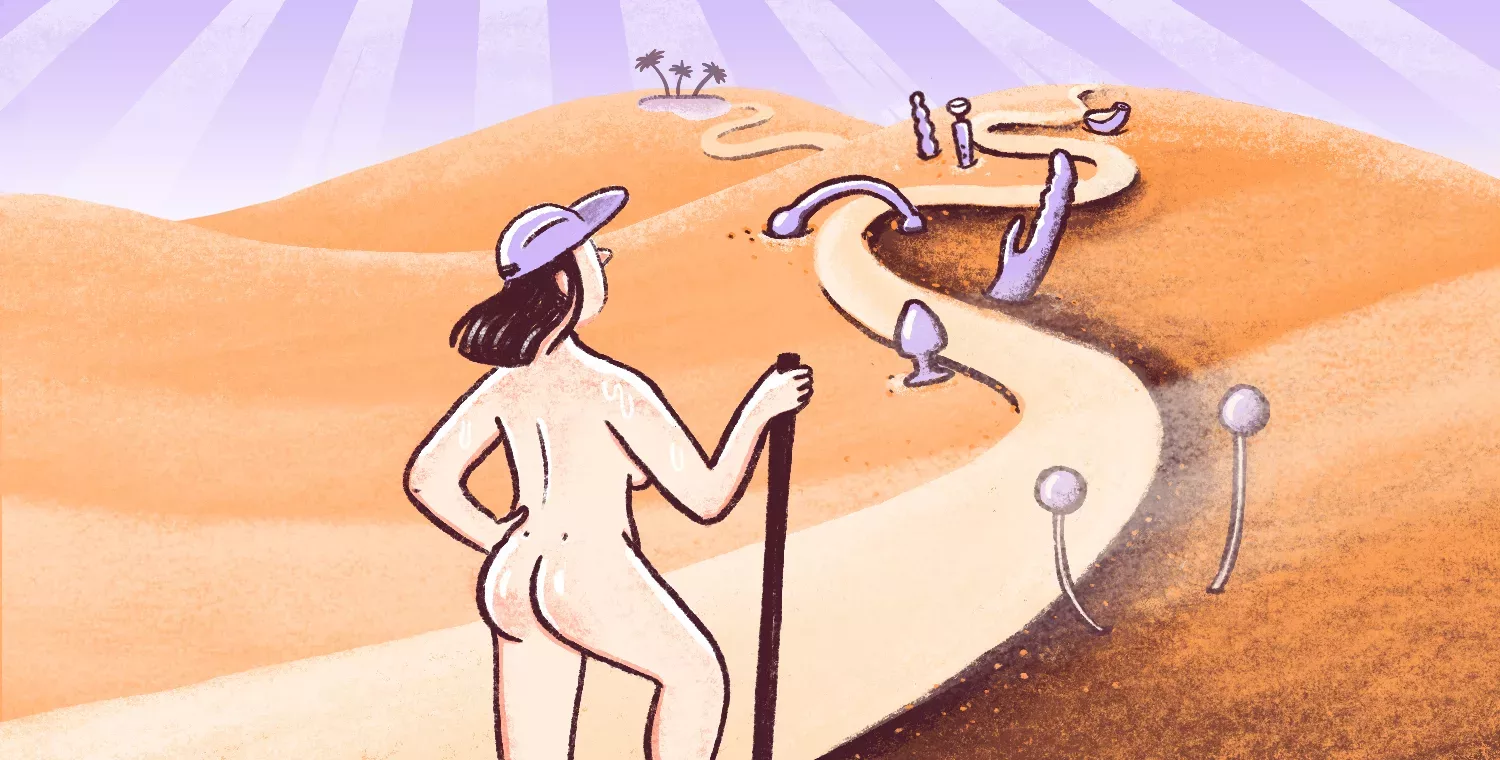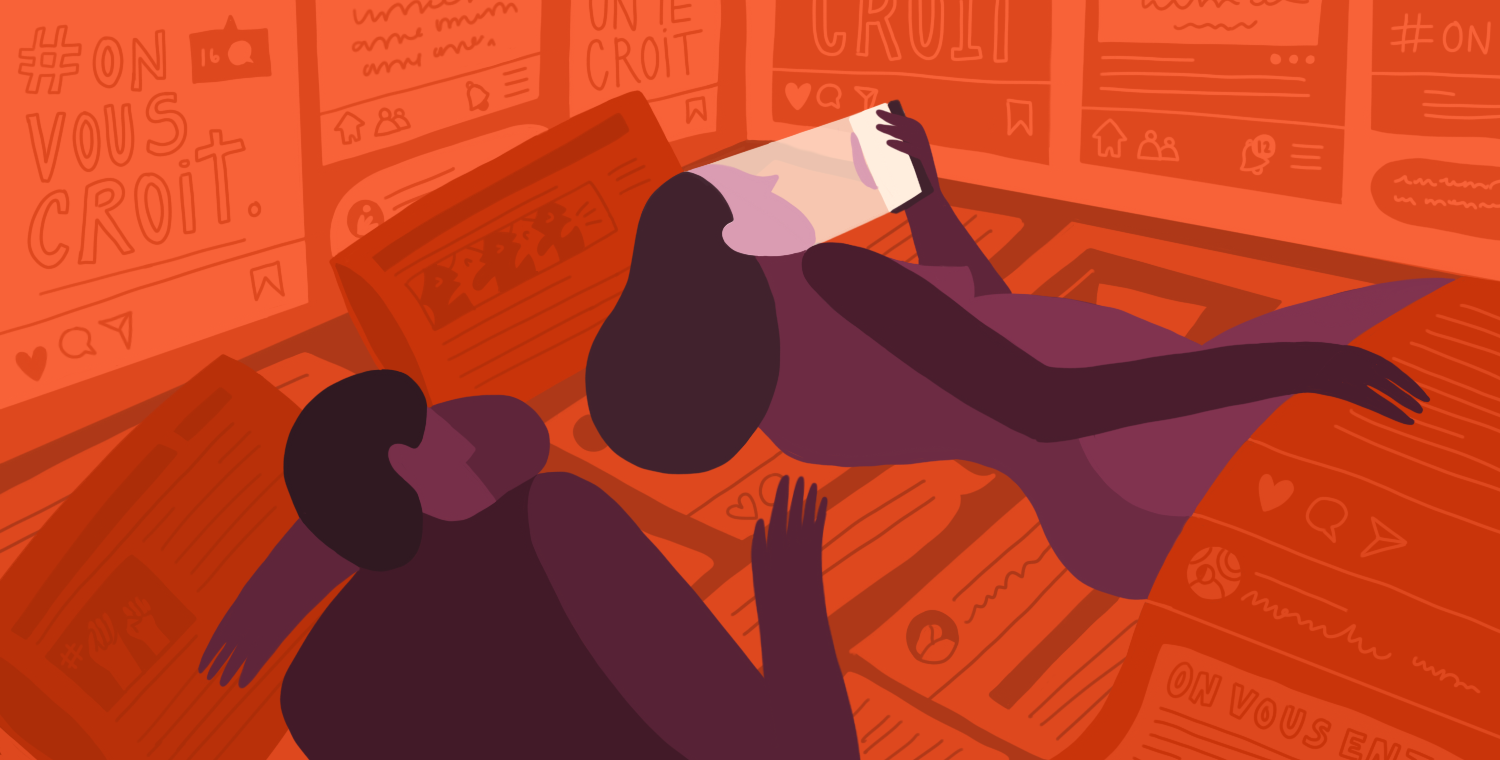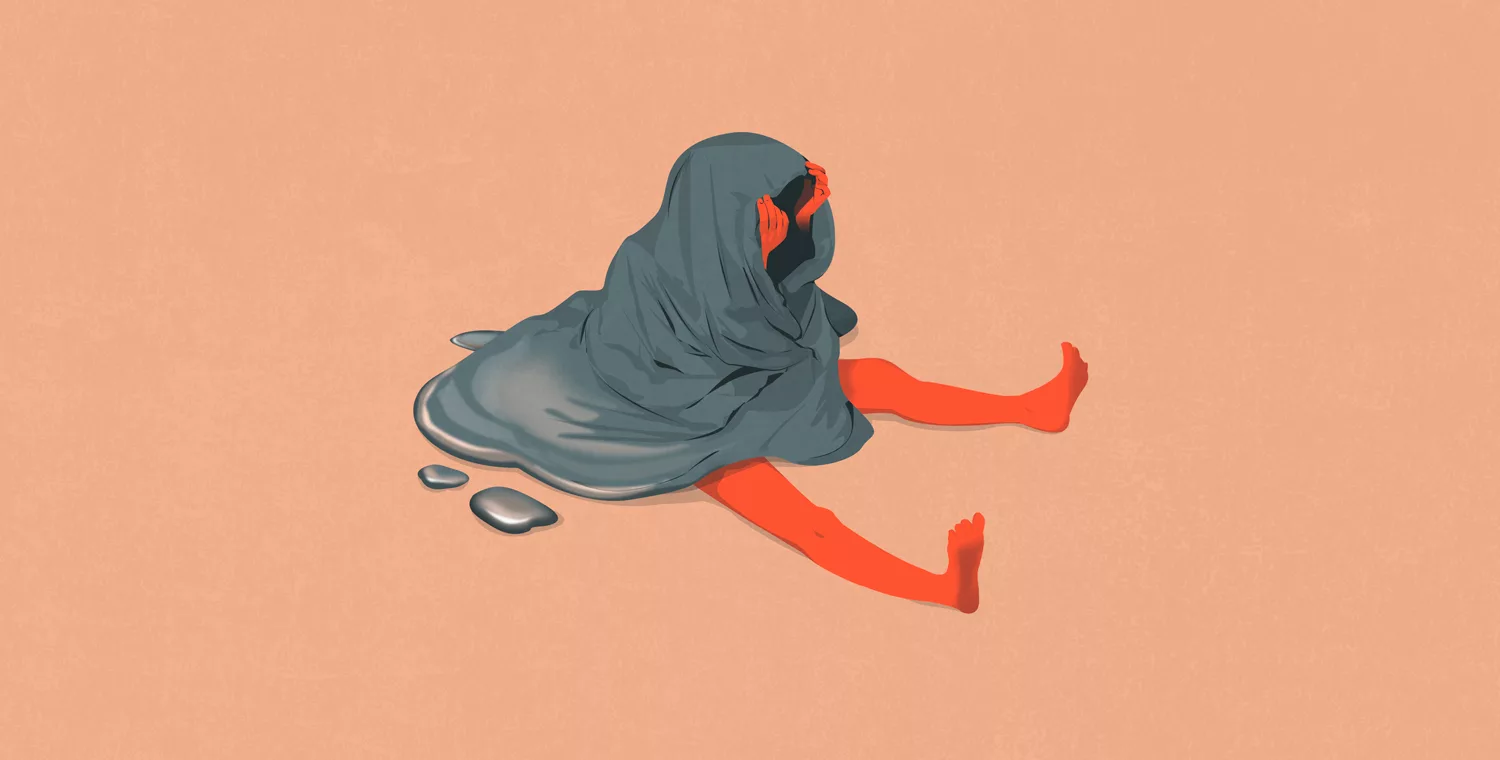Your cart is currently empty!

I Traded my Libido for Antidepressants
“I’ve never slept with someone this dry. This isn’t normal. Are you sure you’re clean? You know, I wouldn’t want to catch anything.”
I was shocked when one of my partners said that to me right in the middle of sex. Being a sexology student, I am highly informed and aware of the importance of getting tested regularly (for STBBIs) and I also used to work in a sex shop. I am very familiar with what encompasses sexuality and I also know that we can always use lube in times like this.
So, you can imagine how disturbed I was by his comment.
When the dust settled, I realized I was more hurt than anything else. Sexuality, which is an important component of my identity, is a sensitive subject, especially since I began taking antidepressants for my GAD.
But Célia, surely your doctor informed you of its potential side effects on sexual function?
Nope. Although most doctors are well aware of the effects antidepressants can have on sexuality, and much research has examined this issue, doctors don’t always broach the subject with their patients. In any case, this meant that I was left to deal with these side effects on my own, without warning, when I started the medication.
Of course, the sexual side- effects vary for each individual and according to the type of drug they take. Personally, I dried up like the Sahara desert, and became anorgasmic (i.e., unable to orgasm). On top of that, my libido became non-existent, which was one of the biggest changes for me. Basically, my sexuality really took a hit. I felt totally lost, without any points of reference.
Fog, loneliness, and reconnection
By the time I started taking antidepressants, it was winter. I had just been dumped, and my anxiety was at its peak. Let’s just say that my sex life (both alone and with a partner) was quite uneventful, which meant that I didn’t really notice the antidepressants’ impact on my sexuality right away.
When I became sexually active again, I hit a wall.
I had a hard time getting wet and reaching orgasm. I felt bad for not coming, so I focused on pleasing my partners. I completely put my own pleasure aside.
From then on, I stopped touching myself altogether and, during sexual encounters, I only focused on my performance. Even though my pleasure had taken a backseat, I felt good. My anxiety was greatly reduced thanks to my little pills and I was able to pleasure my sexual partners.
This beautiful mix nonetheless harmed my self-esteem and sexuality considerably. My self-confidence plummetted and sex had exclusively become tied to my sexual skills and my partners’ feedback. I was completely detached from my body and from the overall purpose of sex, but they say that every cloud has a silver lining.
Mine was being alone with my body and my thoughts when the pandemic hit.
During the first lockdown, I isolated myself to refocus.
I had to learn to rediscover my body and pleasure: to create new benchmarks under the influence of medication.
I reflected on how I wanted to live my sexual experiences with myself and with others. I also had to rebuild my self-esteem and prioritize myself. It wasn’t easy and it took some time (I mean, I’m still learning about myself every day).
On the other hand, having worked in a sex shop was, hands down, very helpful to this personal project. Having access to several types of sex toys every day, always learning more about them, and, in general, being constantly immersed in the subject allowed me to deepen my relationship with my sexuality and to explore it thoroughly.
So, you can imagine the personal journey I undertook.
After taming my desire and getting off the emotional roller coaster, I wondered about what other people who were on antidepressants were going through. After several hours of research, I came up empty-handed.
Unfortunately, few researchers are specifically interested in the sexual side effects of antidepressants in young adults as well as on how subjectively they experience them. Out of curiosity and in search of answers, I turned to those around me.
And I realized that I wasn’t alone. I wasn’t the only one who noticed that different aspects of their sex life took a dive after taking antidepressants. Even though discourses of mental well-being came up in their narratives, I could sense concern in their voices.
Of course, everyone’s journey is different, but anorgasmia and decreased lubrication, sexual desire, and arousal were themes that surfaced in every single story.
Sharing experiences
“Even though it hurt, I wanted to have sex with my boyfriend and I knew I could tolerate the pain. In my mind, I’m positive it provoked my vaginismus. And now, even though I’m no longer on antidepressants, I’m always afraid that it will come back (the pain and burning sensation during penetration), which stresses me out and, therefore, causes my vagina to tighten up and hurt. It’s a vicious circle.”
One of the impacts it has had on my sex life is that I never encouraged my partners to take an interest in my pleasure. I had accepted that I didn’t deserve it, because I had long been unable to have it and I thought that was just the person I was.
“During the first few weeks, I noticed a numbness in my penis. It was as if the head of my penis was less sensitive or that it was covered with ants. It’s much less numb now, though! Now, I notice that I think about sex less often and have fewer sexual fantasies and that attractive people, even TV or movie characters, titillate me less. However, during sex with my boyfriend, I have no erectile problems and I still have lots of desire for him. It’s as if my sexual appetite for novelty had dropped with antidepressants.
Through the sharing of experiences, I was able to realize that I was not the only one who experienced sexual side effects, and that they seemed to be experienced similarly from one person to another. I know we live in a society where everyone always has to seem fine and feel good, but at what cost? It sounded as though a long-term and comprehensive follow-up with our doctors would be necessary in order to better manage and adjust to possible side effects.
A bit of hope
I know that the impact of antidepressants on sexuality is a rather sensitive topic and tends to be portrayed in a negative light, but I want to end on a more positive note.
Despite its repercussions on my sexuality, I still managed to come out on top. I was able to refocus and review my priorities. Rediscovering my body also allowed me to regain my self-esteem and to get to know myself better as a person. This work has brought me a lot of good, both personally and in my relationships. I now have an easier time expressing my desires, asserting that I deserve pleasure, and engaging with people who truly respect me.
I was happy to be able to relate with Zoé’s (she/her) narrative. She told me that the side effects of antidepressants had also allowed her to reconnect with the sexual part of herself and to integrate it more mindfully into her daily life:
“It’s like I’ve discovered a different side of my sexuality that I wasn’t aware of before: a raw, more honest side. I’ve learned to be more creative in how I control or influence my desire, like with music or specific activities.”
This is what I find beautiful in everything I have heard and experienced so far: sexual (re)discovery and reconnecting with oneself. It pushes us to go further and try different things to foster desire and arousal.
As Alexanne (she/her), another person who confided in me, said eloquently: “I’d say that being on antidepressants made me grow, sexually. It forced me to discover other ways to masturbate (e.g., use sex toys); it allowed me to finally dive into more intense sexual pleasure (by practicing BDSM ) and to better listen to my body. It allowed me to become more attuned to the ebb and flow of my sexual desire.”
Herein lies the beauty of being challenged in life: surpassing yourself. I guess what I’m trying to say is that, despite the fact that antidepressants can induce drastic changes in sexual function, we don’t need to get discouraged. We are not alone in experiencing these difficulties and we don’t have to experience them alone either.
-
Baldwin, D.S., & Foong, T. (2013). Antidepressant drugs and sexual dysfunction. The British Journal of Psychiatry, 202, 396–397. https://doi.org/10.1192/bjp.bp.112.110650
Basson, R., Rees, P., Wang, R., Montejo, A. L., & Incrocci, L. (2010). Sexual function in chronic illness. Journal of Sexual Medicine, 7, 374–388. https://doi.org/10.1111/j.1743-6109.2009.01621.x
Conn, A., & Hodges, K. R. (2021). Genitopelvic pain/penetration disorder. In Merck Manual. https://www.merckmanuals.com/en-ca/professional/gynecology-and-obstetrics/sexual-dysfunction-in-women/genitopelvic-pain-penetration-disorder
Engman, M., Wijma, K., & Wijma, B. (2010). Long-term coital behaviour in women treated with cognitive behaviour therapy for superficial coital pain and vaginismus. Cognitive Behaviour Therapy, 39(3), 193–202. https://doi.org/10.1080/16506070903571014
Indiana University. (2009). Studies about why men and women use lubricants during sex. ScienceDaily. https://www.sciencedaily.com/releases/2009/11/091109090431.htm
Hebernick, D., Reece, M., Hensel, D., Sanders, S., Jozkowski, K., & Fortenberry, J.D. (2011). Association of lubricant use with women’s sexual pleasure, sexual satisfaction, and genital symptoms: a prospective daily diary study. Journal of Sexual Medicine, 8(1), 202–-212. https://doi.org/10.1111/j.1743-6109.2010.02067.x
Higgins, A., Nash, M., & Lynch, A.M. (2010). Antidepressant-associated sexual dysfunction: impact, effects, and treatment. Drug, Healthcare, and Patient Safety, 2, 141–-150. https://doi.org/10.2147/DHPS.S7634
Kikuchi, T. Uchida, H., Suzuki, T., Watanabe, K., & Kashima, H. (2010). Patients’ attitudes toward side effects of antidepressants: an Internet survey. European Archives of Psychiatry and Clinical Neuroscience, 261, 103–109. https://doi.org/10.1007/s00406-010-0124-z
Lorenz, T., Rullo, J., & Faubion, S. (2016). Antidepressant-induced female sexual dysfunction. Mayo Clinic Proceedings, 91(9), 1280–1286. https://doi.org/10.1016/j.mayocp.2016.04.033
Mitchell, H. (2004). Vaginal discharge—causes, diagnosis, and treatment. British Medical Journal, 328(7451), 1306–1308. https://doi.org/10.1136/bmj.328.7451.1306
O’Mullan, C., Doherty, M., Coates, R., & Matt Tilley, P.J. (2014). Women’s experiences of coping with the sexual side effects of antidepressant medication. Psychology & Health, 29(12), 1388–1406. http://dx.doi.org/10.1080/08870446.2014.940951
Rosenbaum, T. (2011). Addressing anxiety in vivo in physiotherapy treatment of women with severe vaginismus: A clinical approach. Journal of Sex & Marital Therapy, 37(2), 89–93. https://doi.org/10.1080/0092623X.2011.547340
Serretti, A., & Chiesa, A. (2009). Treatment-emergent sexual dysfunction related to antidepressants: a meta-analysis. Journal of Clinical Psychopharmacology, 29(3), 259–266. https://doi.org/10.1097/JCP.0b013e3181a5233f
Taylor, M. J., Rudkin, L., Bullemor-Day, P., Lubin, J., Chukwujekwu, C., & Hawton, K. (2013). Stratégies de gestion des dysfonctionnements sexuels causés par des antidépresseurs. Cochrane. https://www.cochrane.org/fr/CD003382/DEPRESSN_strategies-de-gestion-des-dysfonctionnements-sexuels-causes-par-des-antidepresseurs
Waldinger, M. D., van Coevorden, R. S., Schweitzer, D. H., & Georgiadis, J. (2015). Penile anesthesia in Post SSRI Sexual Dysfunction (PSSD) responds to low-power laser irradiation: A case study and hypothesis about the role of transient receptor potential (TRP) ion channels. European Journal of Pharmacology, 15(753), 263–268. https://doi.org/10.1016/j.ejphar.2014.11.031.




